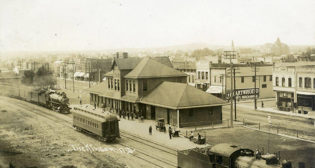
Man vs. Machine: Aurora Rail Edition
Written by William C. Vantuono, Editor-in-ChiefAurora, Ill., voted no on one of the more contentious railroad issues of our automated times: Should freight trains be allowed to operate with one-person crews, with technology taking the place of a second crew member?
The city sent its resolution to the Federal Railroad Administration on April 29, 2016. The FRA is collecting comments until May 16 on a Notice of Proposed Rulemaking mandating two-person crews, and reports an above-average number of comments. Railroads are opposed to the measure.
“It’s not a comforting thought,” Mayor Tom Weisner is on record as saying in supporting two-person crews. “One man is only one man away from zero. If that one has a couple of drinks, or a heart attack, or is just having a bad day, the results could be disastrous.”
Aurora is situated on one of the major rail lines into Chicago, with a population of nearly 200,000.
The FRA is encouraging other communities, and individuals, to submit public comments HERE before May 16.
Editor’s note: Mayor Weisner may not be aware that the railroads will only deploy one-person crews on lines equipped with Positive Train Control. The line through Aurora is a BNSF main that also hosts Metra passenger operations, and thus under federal law will be equipped with PTC. A safety overlay, PTC is designed to prevent overspeed conditions, enforce civil speed restrictions (such as on curves) and prevent train-to-train collisions. Under PTC, an engineer “having a bad day” is basically of little consequence, as PTC is designed to prevent operating mistakes caused by human error, such as lack of concentration. With or without PTC, locomotives are equipped with safety devices designed to automatically stop a train should an engineer become incapacitated by, for example, a heart attack. In terms of alcohol consumption, there are severe penalties, including dismissal and criminal prosecution, for train and engine crew employees who test positive for alcohol or drugs following any incident. So-called Rule G is a prohibition against railroad employees working while intoxicated. It was originally a near-universal provision of individual railroads’ operating rules, and is now part of the universal code of the Association of American Railroads. In addition to prohibiting the use or possession of drugs and alcohol, the rule also provides for “reasonable suspicion”, wherein a rail carrier may require an employee to submit to a breathalyzer or urine test if he or she is suspected of being under the influence. A refusing employee is considered to be in violation and may be suspended or terminated with no further procedure. Download a PDF of CFR-2003-title49-vol4-sec219-803 at the link below for further information.—William C. Vantuono



